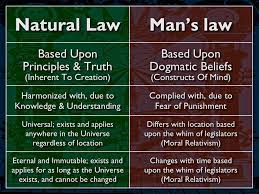Tag Archives: Aristotle in Politics
Eternal and unchanging divine law – 2022 Best

In Summa Theologiae, St. Thomas Aquinas argues that man is governed by two kinds of law, the eternal and unchanging divine law (or its reasonable approximation in natural law) and the impermanent and temporal law of man or positive law.
Eternal and unchanging divine law
Three- Two question essays- each question should be answered in 3-4 pages) citing the book pictured below USE FIRST ESSAY FOR REFERENCE Question #1 In Summa Theologiae, St. Thomas Aquinas argues that man is governed by two kinds of law, the eternal and unchanging divine law (or its reasonable approximation in natural law) and the impermanent and temporal law of man or positive law. With regard to man’s law, Aquinas puts forth, and then rejects, the proposition: It would seem that there is not a human law. For the natural law is a participation of the eternal laws, as stated above. Now, through the eternal law, “all things are most orderly,” as Augustine states.
Eternal and unchanging divine law
Therefore, the natural law suffices for the ordering of all human affairs. Consequently, there is no need for a human law. (Cahn 2012, 306) Using the text for support, please describe Aquinas’ justification of human law and its limits. Pay particular attention to the structure of the just political community. In what ways does this community comport with that described by Aristotle in Politics? Question #2 In The Republic, Plato argues that the role of the Philosopher King is to rule by reason for the collective good and to ensure that each part of society fulfills its specialized role and no other, thus creating a harmonious and just society.
Eternal and unchanging divine law
At the same time, he empowers the Philosopher King to propagate the lie of the Myth of the Metals to achieve this end. Does the propagation of the myth undermine Plato’s notion of justice? Why or why not. Be sure to consider Plato’s conception of the philosopher’s nature and use the text, in addition to your own analysis, to support your argument. Remember that the goal of this question is not to describe Plato’s argument but to critically analyze its implications in your own voice. Plato – http://faculty.smcm.edu/jwschroeder/Web/ETHR1002/Global_Jutice_Readings_files/3.PlatoRepblic.pdf Aquinas – https://d2y1pz2y630308.cloudfront.net/15471/documents/2016/10/St.%20Thomas%20Aquinas-Summa%20Theologica.pdf
Eternal and unchanging divine law
Question #1: I have argued in class that differences in what constitutes the just political society, for liberal contract theorists can be explained as the function of differences in their respective “states of nature.” To put it another way, how the theorists understand human nature outside of the influences of government influences the kinds of political institutions and governments they defend. Please compare and contrast the governments they legitimize based on their different articulations of the state of nature. For example, you may choose to compare Hobbes’ authoritarian Leviathan to Locke’s limited republicanism by comparing how their states of nature lead them to their very different conclusions. Be sure to use specific references to the texts to support your conclusions. https://youtu.be/muPnEu599v8
Eternal and unchanging divine law
Question #2: Merriam-Webster’s Online Dictionary defines Machiavellian as: …suggesting the principles of conduct laid down by Machiavelli (Links to an external site.) ; specifically marked by cunning, duplicity, or bad faith Is Machiavelli Machiavellian? Please use specific references to both The Prince and Discourses, to support your conclusion but remember that the conclusion is to be yours, not Machiavelli’s. Question #1: Using the concept map, assigned readings, and lecture, please trace the conceptual antecedents to the work of Karl Marx. Be sure to use the assigned readings to support your analysis.
Eternal and unchanging divine law
SECTION TWO: PLEASE ANSWER THIS QUESTION Question #2: Please describe under what conditions political power may be legitimately exercised. Be sure to carefully and fully define the operative terms and use texts from the class in addition to your own analysis to justify your definitions, keeping in mind the constraints on good definitions discussed by Lukes and outlined in the syllabus. Specifically, the definition must be “suited for description and explanation” as discussed by Lukes in Chapter Two of PRV (Lukes 2005, 63).






